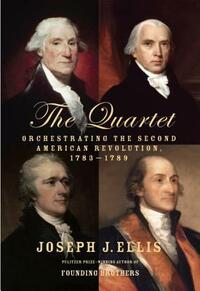You need to sign in or sign up before continuing.
Take a photo of a barcode or cover
107 reviews for:
The Quartet: Orchestrating the Second American Revolution, 1783-1789
Joseph J. Ellis
107 reviews for:
The Quartet: Orchestrating the Second American Revolution, 1783-1789
Joseph J. Ellis
I’ve always been confused about how we “became a nation” and why some people value states’ rights and some value federal power. The Founding Fathers were always depicted in mystical terms —nearly saints who bathed all decisions in prayer. The reality is not that neat. How did we go from a Declaration of Independence to a Constitution with a Bill of Rights tacked on? This book answers those questions.
Must read
This is a fantastic piece peeling back the mythos associated with our Founding Fathers and how the visions of a few people manifested at a critical time in history and led to a document in which that mythos thrives.
This is a fantastic piece peeling back the mythos associated with our Founding Fathers and how the visions of a few people manifested at a critical time in history and led to a document in which that mythos thrives.
A succinct account of the politics and process behind creating the Constitution. Due to the brevity, details and minor characters have, of necessity, been largely ignored.
Ellis has written another concise, accessible book on this fascinating period of American history. The body of the book is only 200 pages, and in those pages, Ellis lays out the problems with the initial American Confederacy and the men who shaped the country. He emphasizes that these men are fallible, and highlights how different they were--and how they all were vital in the process of creating the American government. I particularly enjoyed learning more about Robert Morris and Gouverneur Morris; I knew very little of their contributions.
I highly recommend checking out this book about a little-discussed period. All too often it's just "The Articles of Confederation were problematic, so they held the Constitutional Convention, and then the Constitution was ratified." The story is an interesting one.
I highly recommend checking out this book about a little-discussed period. All too often it's just "The Articles of Confederation were problematic, so they held the Constitutional Convention, and then the Constitution was ratified." The story is an interesting one.
I've read this book twice now. The second time I wanted to read it again after seeing the Hamilton musical. After having seen the musical all of the characters in the book just came alive to me. The debates and arguments made for nationhood were powerful and nuanced. This was an easy read and very interesting and entertaining.
informative
medium-paced
Joseph J. Ellis is one of my favorite historians, in particular because he is a specialist and expert on colonial and revolutionary America and the founding fathers. Ellis is able to isolate the founding fathers from their fanfare and semi legendary status in Americana and really explore the nuances that made the men of their generation - from their wants and dislikes, along with their motivations towards revolution and subsequent shaping of the American republic that we live in today.
Another point that helps Ellis stand out among his peers is that his books don't always focus on more traditional epochs and personas, but rater events and the evolution of ideas from the founding fathers. In "The Quartet", Ellis takes a look at the four personalities that helped usher in the "second American Revolution" - George Washington, Alexander Hamilton, James Madison and John Jay. While Ellis notes that other contemporaries of the time were also part of the monumental process to move the states away from a confederation system to that of a republic, and Ellis outlines how these four in particular were instrumental in shaping the states, legislatures, the fourth estate, the public, and international perspective on ensuring the initiation of a constitutional convention.
I think for many, it is lost on them that the idea of having a constitutional convention - when that was not the original intent behind amending the Articles of Confederation, in an era where getting messages took weeks if not months, was an astounding feat. It is nothing short of a Herculean feat of maneuvering the Constitution from conception into passage and ratification by the states.
If you are looking into reading historical books, or just tying to get into the habit of reading non-fiction, give Ellis and this book a try.
Another point that helps Ellis stand out among his peers is that his books don't always focus on more traditional epochs and personas, but rater events and the evolution of ideas from the founding fathers. In "The Quartet", Ellis takes a look at the four personalities that helped usher in the "second American Revolution" - George Washington, Alexander Hamilton, James Madison and John Jay. While Ellis notes that other contemporaries of the time were also part of the monumental process to move the states away from a confederation system to that of a republic, and Ellis outlines how these four in particular were instrumental in shaping the states, legislatures, the fourth estate, the public, and international perspective on ensuring the initiation of a constitutional convention.
I think for many, it is lost on them that the idea of having a constitutional convention - when that was not the original intent behind amending the Articles of Confederation, in an era where getting messages took weeks if not months, was an astounding feat. It is nothing short of a Herculean feat of maneuvering the Constitution from conception into passage and ratification by the states.
If you are looking into reading historical books, or just tying to get into the habit of reading non-fiction, give Ellis and this book a try.
Probably one of the best history books I’ve ever read. The book focuses on a period of time that I don’t think a lot of Americans have read about.
informative
reflective
medium-paced




